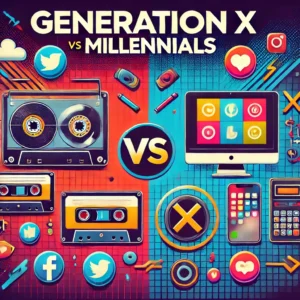Life Style
Millennials vs Gen Z: The Key Differences You Need to Know
The generational divide has always been a topic of discussion, but the differences between Millennials vs Gen Z have become more apparent in recent years. While both groups are tech-savvy and socially conscious, their experiences, behaviors, and values set them apart in significant ways. Understanding these differences is crucial for employers, marketers, educators, and anyone looking to connect with these influential generations.
So, what makes Millennials (born between 1981-1996) different from Generation Z (born between 1997-2012)? This article will explore their defining traits, technological preferences, work ethic, financial habits, communication styles, shopping behaviors, and cultural outlooks.
Technology and Social Media Use
One of the biggest distinctions between Millennials vs Gen Z is how they interact with technology. Millennials grew up during the rise of the internet but still experienced an era without social media and smartphones. They transitioned from dial-up internet and early social platforms like MySpace to today’s digital world.
On the other hand, Gen Z is the first true generation of digital natives. They have never known a world without instant internet access, social media, and mobile devices. Their preferred platforms lean toward short-form and visually engaging content such as TikTok, Instagram, and Snapchat, whereas Millennials are more likely to use Facebook, Twitter, and LinkedIn for networking and communication.
Comparison:
- Millennials: Experienced the transition from offline to online; comfortable with both traditional and digital platforms.
- Gen Z: Fully immersed in digital culture; favors quick, engaging, and video-based content over text-heavy platforms.
Workplace Attitudes and Career Goals
Millennials: Seeking Purpose and Work-Life Balance
Millennials entered the workforce during a time of economic uncertainty, particularly following the 2008 financial crisis. This experience shaped their approach to work, leading them to prioritize meaningful jobs that align with their values. They seek work-life balance and are known for embracing remote work and flexible schedules. Millennials also value collaboration, teamwork, and mentorship opportunities in their careers.
Gen Z: Independent and Financially Focused
Gen Z, on the other hand, has a more independent mindset when it comes to their careers. Growing up witnessing economic instability and rising student debt, they prioritize financial security and career growth. Unlike Millennials, who often job-hop in search of fulfillment, Gen Z values stability and professional development. They are also more entrepreneurial, with many Gen Zers exploring side hustles, freelancing, and online businesses to supplement their income.
Comparison:
- Millennials: Value passion-driven careers and work-life balance.
- Gen Z: Prioritize financial stability, career growth, and side hustles.
Financial Habits and Spending Preferences
Millennials: Experience Over Ownership
Millennials are often labeled as the “experience generation.” They prioritize experiences such as travel, concerts, and dining over material possessions. This mindset extends to their approach to homeownership, with many delaying buying a house due to economic challenges and preferring renting instead.
Gen Z: Pragmatic and Debt-Averse
Gen Z is more financially cautious compared to Millennials. Having seen the burden of student loans and economic downturns, they prioritize saving and avoiding debt. They are more likely to seek alternative education paths, such as online courses and trade programs, instead of taking on hefty student loans. Gen Z also tends to favor thrifting, second-hand shopping, and budget-friendly brands, making them more pragmatic spenders.
Comparison:
- Millennials: Spend more on experiences and lifestyle; more willing to take on debt.
- Gen Z: Focused on saving and avoiding financial risks; prefer affordability and practicality.
Communication Styles and Social Values
Millennials: The Email and Texting Generation
Millennials are comfortable using both traditional and digital communication methods, including emails, texts, and phone calls. They also embrace professional networking platforms like LinkedIn and prefer detailed, structured communication when engaging with brands and employers.
Gen Z: Instant and Visual Communication
Gen Z prefers quick, visual communication through memes, emojis, and video content. They favor messaging apps like WhatsApp, Snapchat, and Discord over emails and formal texts. Their communication style is fast-paced, direct, and often informal, which influences how brands and businesses engage with them.
Comparison:
- Millennials: Prefer structured, detailed communication (emails, long texts, LinkedIn posts).
- Gen Z: Engages through quick, visual, and informal communication (GIFs, TikToks, Snapchat).
Shopping and Consumer Behavior
Millennials: Brand Loyalty and Ethical Consumerism
Millennials tend to be brand loyal and appreciate companies that align with their values, such as sustainability and corporate social responsibility. They are more willing to pay a premium for high-quality and ethically sourced products.
Gen Z: Affordability and Instant Gratification
Gen Z is less brand-loyal than Millennials, prioritizing affordability and convenience. They expect fast shipping, seamless mobile shopping experiences, and personalized recommendations. Social media influencers and peer reviews strongly influence their purchasing decisions.
Comparison:
- Millennials: Prefer brand loyalty and ethical purchasing.
- Gen Z: Value affordability and speed over brand loyalty.
Cultural and Social Awareness
Millennials: Pioneers of Social Change
Millennials played a major role in raising awareness about social justice issues, sustainability, and workplace diversity. They popularized activism through social media campaigns and are vocal about supporting ethical brands.
Gen Z: The Digital Activists
While Millennials laid the foundation for digital activism, Gen Z has taken it to another level. They use social media as a tool for real-time advocacy, holding brands and influencers accountable. Their activism is action-driven, with many participating in online petitions, grassroots movements, and viral awareness campaigns.
Comparison:
- Millennials: Focused on long-term activism and traditional advocacy.
- Gen Z: Uses digital platforms to demand immediate change and accountability.
Conclusion about Millennials vs Gen Z
While Millennials and Gen Z share some similarities, their differences in technology use, workplace attitudes, financial habits, and social values shape how they interact with the world. Millennials seek purpose and experiences, while Gen Z prioritizes financial security and efficiency. Understanding these key differences is essential for businesses, employers, and anyone looking to engage with these dynamic generations.
By recognizing their unique characteristics and preferences, organizations can tailor their strategies to connect effectively with both Millennials and Gen Z, ensuring they remain relevant in an ever-evolving social and economic landscape.






